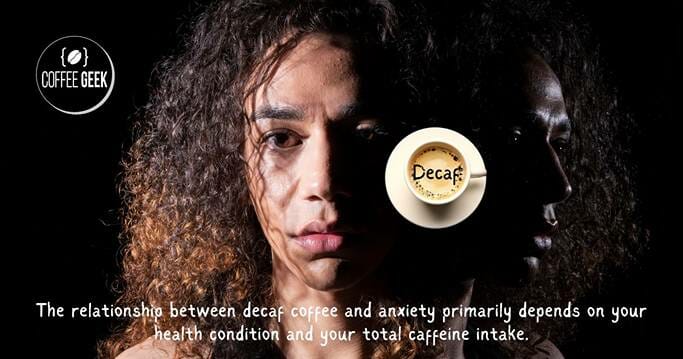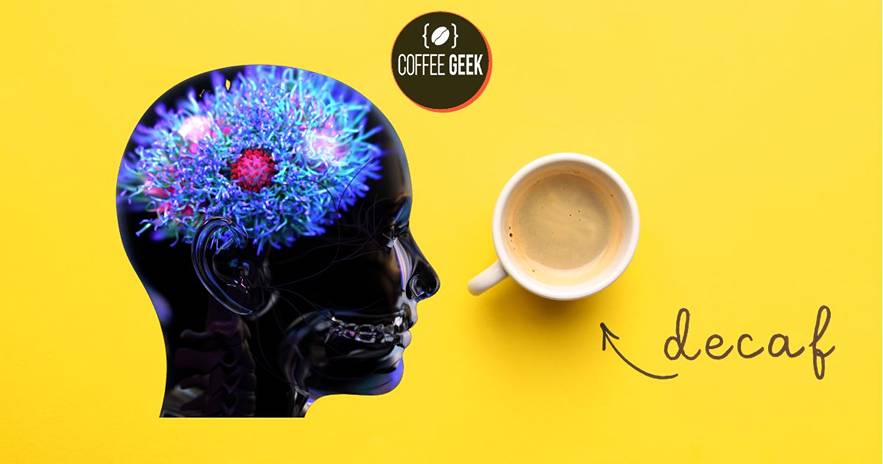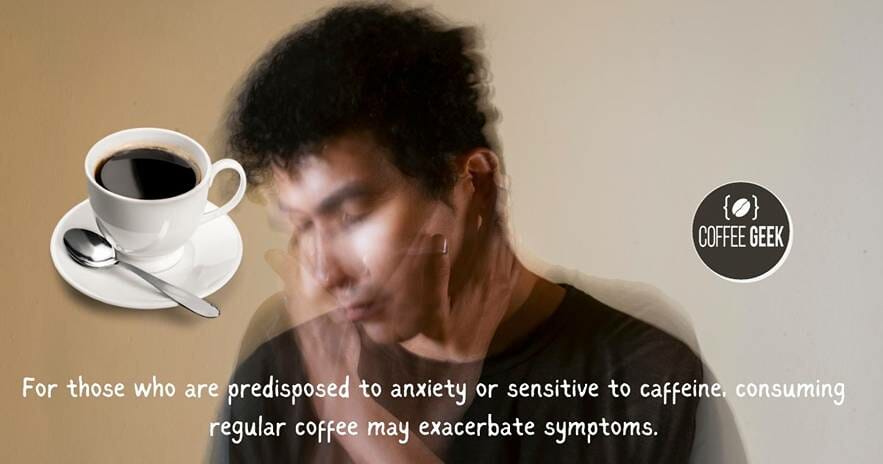Decaf coffee has become a popular alternative for those looking to cut down on caffeine.
Many people wonder if it can cause anxiety, considering the common association between anxiety and regular, caffeinated coffee. Can decaf coffee cause anxiety?
The relationship between decaf coffee and anxiety primarily depends on your health condition and your total caffeine intake.
Decaffeinated coffee, as the name suggests, is a coffee variant with most of its caffeine content removed.
Given the reduced presence of caffeine, it may offer a better choice for individuals seeking to lower anxiety-related complications.

However, it’s important to remember that decaf coffee still contains a small amount of caffeine, which may affect those who are extremely sensitive to its impact.
Key Takeaways
Decaf coffee contains a significantly reduced amount of caffeine, making it a better choice for managing anxiety
Your health condition and total caffeine intake play a crucial role in whether decaf coffee can cause anxiety
Decaf may be a suitable alternative for those extremely sensitive to caffeine, but it still contains a small amount of the stimulant
Drinking Decaf Coffee and Anxiety
Caffeine Intake, Decaf Coffee, and Anxiety
Drinking decaf coffee goes through a decaffeination process that removes most of the caffeine. However, it still contains a small amount of caffeine, which might affect your anxiety levels.
Regular caffeine consumption can mimic symptoms of anxiety, such as nervousness, restlessness, and trouble sleeping.

Caffeine Sensitivity – Can Decaf Coffee Cause Anxiety?
Your sensitivity to caffeine varies based on your genetics, lifestyle, and overall health. While some people can handle moderate amounts of caffeine, others might experience anxiety even from lower doses found in decaf.
If you suspect you have a sensitivity to caffeine, pay attention to how your body responds when consuming decaffeinated coffee and adjust your intake accordingly.

Caffeine-Induced Anxiety Disorder
It’s important to note that a 2004 review discovered caffeine-induced anxiety disorder in individuals with or without pre-existing anxiety.
High intake of caffeine (over 400 milligrams per day or about four to five cups of coffee) may increase the likelihood of anxiety and panic attacks.
Since decaf coffee still contains a minimal amount of caffeine, be cautious when considering it as a substitute for regular coffee.
Decaffeination Process and Decaf Coffee
Decaffeination Methods
Decaffeinating coffee involves removing most of the caffeine content from the coffee beans. It is important to know that decaf coffee still contains a small amount of caffeine, approximately 2 mg per cup.
The methods for decaffeination are diverse, ranging from using chemical solvents to water-based processes. You have options, such as the Swiss Water Process, which doesn’t involve chemicals and is a more natural approach.

Quality and Taste
When it comes to the quality and taste of decaf coffee, it mostly depends on the decaffeination method used and the coffee beans’ origin.
The Swiss Water Process preserves the coffee’s flavor compounds, making it a popular choice for maintaining taste. However, the flavor can be slightly altered due to the decaffeination process from coffee beans.
In conclusion, decaf coffee’s taste and quality can be affected by the decaffeination method. Your choice of coffee can vary depending on your preference for taste and the processing.
It is essential to know that even decaf coffee contains a small amount of caffeine, so consider your consumption based on your sensitivity to caffeine.
Health Benefits of Decaf Coffee
Antioxidants
Decaf coffee is a great source of antioxidants, which help to protect your cells from damage caused by free radicals. One of the main antioxidants found in decaffeinated coffee is chlorogenic acid.
This antioxidant can help reduce inflammation and improve overall health. As a result, you may experience better skin health and slow down the aging process.

Reducing Disease Risks
In addition to antioxidants, decaf coffee has been linked to reducing the risk of certain diseases. Although the evidence is not as strong as for caffeinated coffee, decaf coffee still offers some potential health benefits.
Type 2 Diabetes: Drinking decaf coffee may help to reduce your risk of developing type 2 diabetes. This is because chlorogenic acid can help improve insulin sensitivity and glucose metabolism.
Cancer: Consuming decaf coffee has also been associated with a reduced risk of certain types of cancer. For example, it has been shown to have a protective effect against rectal cancer.
The antioxidants, such as chlorogenic acid, found in decaf coffee may be responsible for this protective effect.
While decaf coffee offers some potential health benefits, it is essential to remember that a balanced diet and a healthy lifestyle are crucial for maintaining good overall health.
Make sure to consult your healthcare provider if you have any concerns about your intake of caffeine, and enjoy your decaf coffee in moderation.
Side Effects and Comparisons
Decaffeinated Coffee vs. Regular Coffee
When comparing decaffeinated coffee to regular coffee, it’s important to understand the key differences between the two.
Decaf coffee goes through a process to remove most of the caffeine, resulting in a beverage that contains only a small amount of this stimulant.
While regular coffee can contain around 95 mg of caffeine per 8-ounce cup, decaf typically has around 2 to 5 mg per cup.
This reduced caffeine content can make decaf a better option for those who are sensitive to caffeine or looking to reduce their consumption.
However, it’s important to note that even decaf is not entirely caffeine-free, and if you’re extremely sensitive to caffeine, even small amounts may cause some symptoms.
In addition to caffeine, coffee also contains other compounds that can affect mood and behavior, such as chlorogenic acids, which may have a stimulating effect on the nervous system.
Effects on Mental and Physical Health

Mental Health: For those who are predisposed to anxiety or sensitive to caffeine, consuming regular coffee may exacerbate symptoms.
Caffeine is a recognized stimulant that can increase alertness, heart rate, and blood pressure, sometimes leading to feelings of nervousness and anxiety.
Decaf coffee, with its lower caffeine content, could be a helpful alternative for individuals looking to minimize these effects.
However, be aware that some people may still experience anxiety after they drink coffee, consuming decaf, as other compounds in coffee can contribute to these feelings.
Physical Health: When comparing the physical health effects of decaf to regular coffee, it’s useful to examine potential side effects of caffeine.
Caffeine can cause symptoms such as rapid heartbeat, sweating, restlessness, and tenseness.
While decaf coffee may result in fewer of these symptoms due to its reduced caffeine content, it’s still essential to monitor your individual reactions and intake.
Withdrawal: Cutting out regular coffee and switching to decaf can lead to caffeine withdrawal symptoms. These may include headaches, fatigue, irritability, and difficulty concentrating.
To avoid or reduce withdrawal symptoms, you may want to gradually decrease your intake of caffeine instead of quitting cold turkey.
In conclusion, the choice between decaf and regular coffee depends on your personal sensitivities and preferences.
Decaf coffee might be a better option for those looking to reduce their intake of caffeine or minimize anxiety symptoms, but it’s essential to remember that every individual may respond differently to both regular and decaf coffee.
| Factor | Influence on Anxiety | Explanation |
|---|---|---|
| Caffeine Content | Low | Decaf coffee contains only trace amounts of caffeine, reducing its potential to cause anxiety compared to regular coffee. |
| Individual Sensitivity | Variable | People react differently to caffeine, even in small amounts. Some individuals may still experience anxiety with decaf due to sensitivity. |
| Other Compounds | Minor Effects | Decaf coffee contains other compounds like antioxidants, which can have minor effects on mood and anxiety levels. |
| Preparation and Additives | Potential Triggers | Ingredients added to decaf coffee, like sugar or artificial sweeteners, can contribute to anxiety in some individuals. |
| Timing of Consumption | May Affect Sleep | Consuming decaf coffee close to bedtime can disrupt sleep patterns, indirectly contributing to anxiety for some people. |
| Psychological Factors | Individual Perception | Expectations and beliefs about the effects of decaf coffee can influence anxiety levels when consuming it. |
| Overall Risk | Low | While decaf coffee may have some minor effects on anxiety, its overall risk for causing significant anxiety is relatively low. |
Final Thoughts on Decaf Coffee and Anxiety
So, you might be wondering whether drink decaf coffee can cause anxiety. Let’s put your mind at ease! In general, decaf coffee is a better choice for those prone to anxiety, as it has most of its caffeine removed.
Since caffeine is known to cause symptoms similar to anxiety, such as nervousness, restlessness, and a rapid heartbeat, switching to decaf can be a great solution to mitigate these unwanted effects.
That being said, it’s important to remember that moderation is key. While it’s true that decaf coffee has significantly less caffeine than regular coffee, it’s not completely caffeine-free.
So, if you’re particularly sensitive to caffeine or already consume other caffeinated beverages, you’ll want to keep an eye on your total caffeine intake to avoid potential anxiety symptoms.
In addition to cutting down on how much caffeine you take, try embracing a balanced lifestyle that helps reduce anxiety.
This might include exercise, meditation, or seeking professional support to help you manage your symptoms.
In summary, decaf coffee can be a friendlier option for those dealing with anxiety. Switching to decaf may help you satisfy that coffee craving without triggering anxiety symptoms.
Just remember to keep your caffeine intake under control, maintain a balanced lifestyle, and enjoy your decaf in moderation. Happy sipping!
Frequently Asked Questions
Does decaf coffee have any side effects in females?
Decaf coffee can generally be consumed safely by women without any major side effects. As with all coffee, moderation is key, and individual reactions may vary.
However, some reports suggest that even decaf can cause anxiety-like symptoms in sensitive individuals.
Can decaf coffee affect sleep?
While decaf coffee contains only a minimal amount of caffeine, it may still affect your sleep, especially if you’re sensitive to caffeine.
Consuming decaf close to bedtime might impact your ability to fall asleep or stay asleep. Keep in mind that individual reactions may vary, so it’s important to monitor how your body responds.
Why does decaf coffee make some people feel strange?
Decaf coffee can sometimes make people feel strange due to residual caffeine or compounds present in the decaffeination process.
Some individuals might experience mild drowsiness or headaches after consuming decaf, as mentioned in this source.
Does decaf coffee contribute to dehydration?
Decaffeinated coffee is not known to have a significant diuretic effect, so it’s unlikely to contribute to dehydration. However, always remember to stay well-hydrated by consuming enough water and other hydrating liquids throughout the day.
Can decaf coffee lead to heart palpitations?
Decaf coffee contains very little caffeine, but in some cases, the small traces of caffeine present might still cause heart palpitations in sensitive individuals.
If you’re worried about this, pay close attention to your body’s reaction to decaf coffee, and consult your doctor if needed.
Is decaf coffee consumption beneficial at night?
Drinking decaf coffee in the evening can provide the flavor and comfort of a late-night drinking coffee without the unwanted effects of caffeine on sleep.
As with all caffeinated products, it’s essential to listen to your body and adjust your consumption habits accordingly, ensuring you maintain a healthy sleep schedule.

